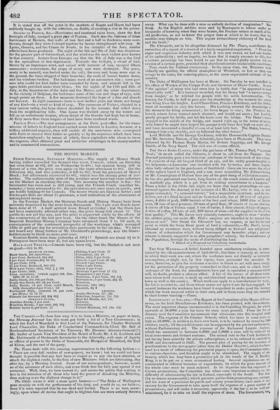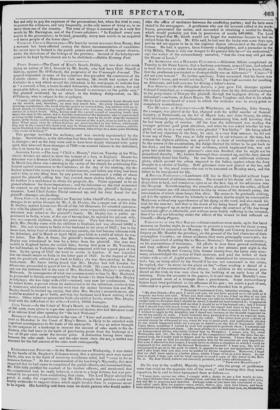THE CARINET.—To show how easy it is to form a
Ministry, on paper at least, the Morning Journal has this week put forth a list of a Tory Government; in which the Earl of Mansfield is first Lord of the Treasury, Sir Charles Wetherell Lord Chancellor, the Duke of Cutnberland Commander-in-Chief, Mr. Bell of Northumberland Secretary of the Treasury, Mr. Denmati Attorney-General (?) Mr. Sadler of Leeds Vice President of the Board of Trade, Mr. J. G. Lockhart and Mr. Holdsworth of Dartmouth Secretaries to the Admiralty, with seats of dignity or offices of power to the Duke of Newcastle, the Marquis of Bland ford, the Earl of Eldon, and the rest of the party. The Times deals with this amusing superstructure in the following fashion :- c There are very dull readers of newspapers, we know; but we could not have thought it possible that any had been so stupid as to pay the least attention, or attach the slightest credit, to the lists of new Ministers which are fabricating, day after day, by a Morning Journal. Some of our correspondents, however, assure us of the existence of such idiots, and even think that the folly may spread if not corrected. Well, then, we here correct it; and assure the public that nothing is less in the intention of all those who have the power of dissolving the Ministry, than making even the slightest change in it." The Globe treats it with a more quiet humour :—" The Duke of Wellington goes steadily on with the performance of his duty, and would do so, we believe, -even if it were reported that he was dead and buried. There is no man, seem- ingly, upon whom all stories that ought to frighten him are more entirely thrown away.. What can be done with a man so entirely destitue of imagination ? No. thing. As the English soldiers were said by Buonaparte to labour under en incapacity of knowing when they were'beaten, the Premier retains so much of his old professionyas not to know the proper time at which to lie down, that his enemies may tralhple on him. This argues extraordinary obduracy of the head and the heart." The Chronicle, not to be altogether distanced by The Tunes, contributes the correction of a report of a renewal of a lately-suspended negotiation. " From the eager and suspicious industry with which It was sent round, we had our doubts of its authenticity ; and on inquiry, we learn that it simply amounts to this, that a certain personage has been heard to say that he would gladly receive the ac. cession of a certain party, provided they abandoned certain inadmissible conditions. Thus stands the Cabinet controversy. In the inean time, the Ministers Mill- vidually are quitting the official atmosphere of Whitehall, as fast as they can escape to the coast, the watering-places, or the more sequestered retreats of the country. The Duke of Wellington has been at Dover. On Tuesday he was installed in his office of Warden of the Cinque Ports and Governor of Dover Castle. It was " the opinion" of many who had seem him in battle, that "he appeared to look remarkably well." It is however recorded, that his Grace had "a narrow escape from danger," as he witched the people with his noble horsemanship, "In leaving the Castle, he hail to pass over the drawbridge at the moment the saline was firing from the heights. Lord Clanwilliam, Princess Esterhazy, and the Duke, were all mounted on very fine horses. His Lordship entered the drawbridge at the moment the firing commenced; his horse began to rear; the Princess fol- lowed, whose horse seemed much alarmed, and 'would not move ; but Lord C. gently grasped the bridle, and led the horse over the bridge. The Duke's horse stopped in the middle of the bridge, and reared right up, to the terror of many, who feared he might have leaped the parapet (only three feet high on each side), and have descended a dreadful chasm of at least forty feet. The Duke, however, managed him very steadily, and he followed the other horses." Lord Melville and Sir George Cockburn, with the Honourable Captain Dundas and Mr. Secretary Barrow, of the Admiralty, have been at Plymouth. They were followed by Sir Thomas Byain Martin, Sir Robert Seppiugs, and Mr. George Smith, of the Navy Board. The visit was of course official. THE SWAN RIVER COLONY, under the guidance of Mr. Thomas Peel, "a second Noah," in an ark called the Gilmore, is about to sail from the Thames. The Journal yesterday gave a too ludicrous catalogue of the farm-stock of the colony. " It consists of one old he-goat blind of an eye, and his sickly grand-daughter zis his helpmate—a Lancaster cow troubled with the hysterics, and three Argyle. shire bulls refused by the purchasers of Smithfield : there are two ewes the select of the ugliest breed in England, and a ram more resembling Mr. Edward Irving or Mr. Cunningham of Harrow than any of the good sheep of a Christian country; he has also patronised one horse, long known on the coach stands of London, and a maidenly pig, which is a pet from its striking resemblance to a kangaroo." Fronts a letter in the Globe last night, we learn that legal proceedings are com- menced against the Journal, at the instance of a Mr. Levey, who is not, as that paper insinuated, "a returned convict," but a respectable merchant, and the fur-
nisher, not of a blind he-goat and an hysterical cow, but of 20 tons of salt provi- sions, 4 dint!, of pork, 1000 bushels of the best seed wheat, 1000 ditto of Indian
corn, 10 tons of seed potatoes, 20 tons of good flour, 20 chests of hyson skin tea, 4 chests of Isle of France sugar, 1 ton of butter, 1 ditto cheese,4 bags of pepper, 4 ditto of coffee, 10 tons of salt, 200 dozen of wine—all the supplies to be of the best quality." This Mr. Levey very naturally conceives, ought to show "whether the settlers going out under-41r. Peel's auspices are intended to be treated like slaves or not." Our friend the Chronicle has, we suspect, at last hit the real point in which tine Swan River grant of land is vulnerable,—Mr. Peel's having obtained an enormous tract, without being obliged to forward any enlightened scheme of colonization which the Government tnay hereafter adopt ; and one scheme is already suggested in an able pamphlet,* namely, the Concentration of the Population, through the mode of distributing the land.
* Sketch of a Proposal for Colonizing Australasia.
THE SILK WEAVERS.—A belief, founded upon satisfactory evidence, is enter- tained by the silk-manufacturers of Spitalfields, that there is scarcely an instance in which their work was cut, where the workmen were not directly or indirectly accomplices, or might not, by due vigour; have prevented the mischief. In order, therefore, to give tine workmen a motive in future to act with more energy for the protection of the property committed to their care, and to check future outrages of the kind, the manufacturers have put in operation a measure which will, no doubt, produce a salutary effect. A list of the names of all those work- men whose work was cut, is made up and circulated amongst the manufacturers in town as well as the country. When workmen apply to a manufacturer for work, time list is resorted to, and those whose names are upon it are the last engaged. In several instances the workmen have found it expedient to make good the damage which time work received whilst in their care, and in those cases they are restored to their former standing—Times. I NI PROVE mENT OF lens:taus—The Report of the Committee of the House of Com- mons, on the Irish Miscellaneous Estimates, has been printed, with the evidence. The most important change recommended is in the Foundling Hospital, for which upwards of. 30,0001. a year has been for some years granted. From the lot of January next the Committee recommends that admissions into this hospital shall cease. The expense of the Charter Schools, which has been in some years so high as 38,0001., in addition to their own funds, is to be reduced by removing 300 children yearly, till the establishment can be supported by the present endowment, without Parliamentary aid. The expense of the Richmond Lunatic Asylum, which has amounted to between 6,000/. and 7,000/. a year, will be relieved by local assessments and distinct asylums. The annual vote to the Cork institution, not having been aided by the private subscriptions, is to be reduced to one-half in 1830, and discontinued in 1831. The present plan of paying for the insertion ot proclamations in tine newspapers (other than time Dublin Gazette), which has been used as a mode of influencing the provincial papers, is open, the Committee states, to various objections, and therefore ought to be abandoned. The supply of sta- tionery, which has long been a productive job in the hands of Sir A. Bradley King, is to be put on a more economical footing. Several regulations are re- commended in different branches of expenditure, by which the gross amount ot the whole votes must be much reduced. In its inquiries into the expenses of Crown prosecutions, the Committee has taken some important evidence on the difficulty of administering, the law in Ireland, especially in the South. The fear (by no means unreasonable) which prevents parties from prosecuting any outrage, and the want of a provision for parish and county prosecutions, have made it ne- cessary for the Government to take upon itself the expense of a great number of prosecutions, and will make it necessary, apparently, if the law is to be well ad- ministered, for it to take on itself the expense of more. The Government, tool
has not only to pay the expenses of the prosecutions, but, when the trial is over, to protect the witnesses, and very frequently, as the only means of doing so, to re- move them out of the country. The state of things is summed up in a very few words by Mr. Barrington, one of the Crown solicitors : " In England every man assists in the prosecution ; in Ireland, generally, every man assists in an acquittal —I mean people of the lower class."
CATHOLIC CHURCH Discieuree.—We learn by recent accounts from Rome, that a measure has been effected vesting the future recommendation of candidates for vacant sees in Ireland in the parish priests and canons of the vacant diocess, under the directions of the bishops of the province. Several of the holydaysen- joined to be kept by the church are to be abolished.—Dubtia Evening Post.



















 Previous page
Previous page